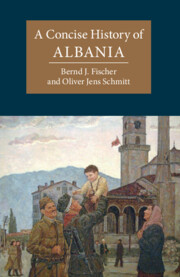Book contents
- A Concise History of Albania
- Cambridge Concise Histories
- A Concise History of Albania
- Copyright page
- Contents
- Illustrations
- Maps
- Preface
- Part I Between Regional Self-Will and Imperial Rule
- 1 The Space and Time of Albanian History
- 2 The Albanians in the Middle Ages, 500–1500
- 3 The Albanians under Ottoman Rule: The Classic Period of Arnavutluk, 1500–1800
- 4 Ottoman Arnavutluk in Crisis, 1800–1912
- Part II State and Nation Construction
- Political Systems and the Principal Political Leadership since Independence in 1912
- Suggestions for Further Reading (literature in non-Balkan languages)
- Index
3 - The Albanians under Ottoman Rule: The Classic Period of Arnavutluk, 1500–1800
from Part I - Between Regional Self-Will and Imperial Rule
Published online by Cambridge University Press: 18 October 2022
- A Concise History of Albania
- Cambridge Concise Histories
- A Concise History of Albania
- Copyright page
- Contents
- Illustrations
- Maps
- Preface
- Part I Between Regional Self-Will and Imperial Rule
- 1 The Space and Time of Albanian History
- 2 The Albanians in the Middle Ages, 500–1500
- 3 The Albanians under Ottoman Rule: The Classic Period of Arnavutluk, 1500–1800
- 4 Ottoman Arnavutluk in Crisis, 1800–1912
- Part II State and Nation Construction
- Political Systems and the Principal Political Leadership since Independence in 1912
- Suggestions for Further Reading (literature in non-Balkan languages)
- Index
Summary
Chapter 3 describes how profoundly the Ottoman conquest changed Albania. Devastation and flight completely altered the settlement structures, especially in the north. Albanians fled not only to Italy but also into the mountains, where they organized themselves into tribal structures. On the plains and especially in the south, many people came to terms with the new empire. Islamized Albanians became an essential pillar of the Ottoman military and administrative structures. Until around 1600 the southwestern Balkans remained mostly Christian, either Orthodox or Catholic. In the course of the seventeenth century, most Albanians converted to Islam for various reasons making the region even more religiously diverse. In addition to Sunni Islam, the Bektashi dervish order, which had absorbed Shiite and Christian influences, also established itself. In the early modern period, three religious cultures coexisted side by side, Orthodox, Catholic, and Muslim, whose adherents maintained cultural contacts not only with each other, but also with their co-religionists outside the area. The southwestern Balkans formed a peripheral zone of the empire. The imperial administration could barely control the mountain regions in a sustainable way. The result was a legal pluralism, with many Albanians, especially in the mountain areas, seeing customary law as a pillar of their identity and their special political position.
- Type
- Chapter
- Information
- A Concise History of Albania , pp. 57 - 98Publisher: Cambridge University PressPrint publication year: 2022



